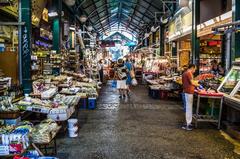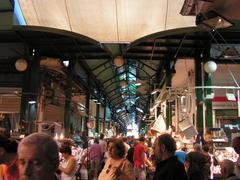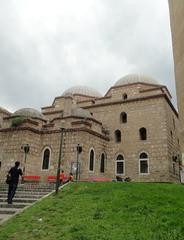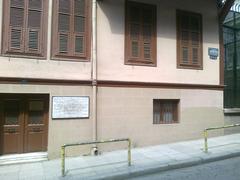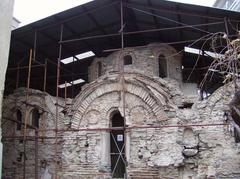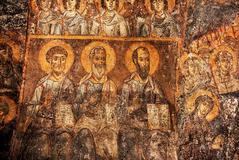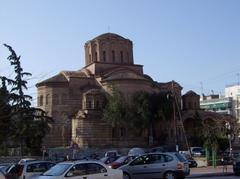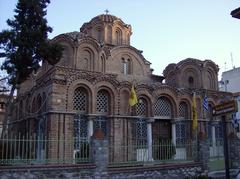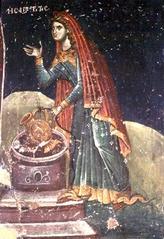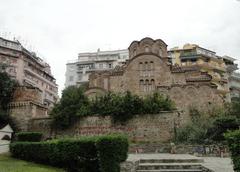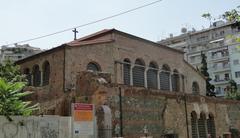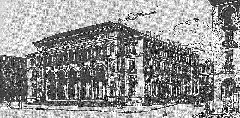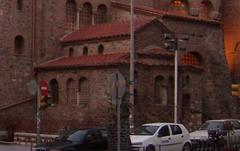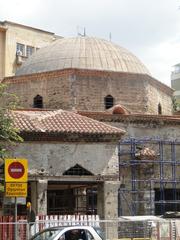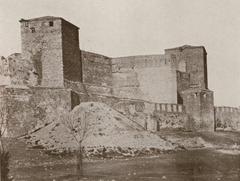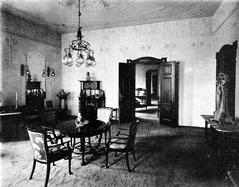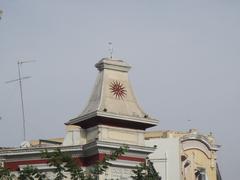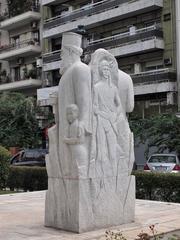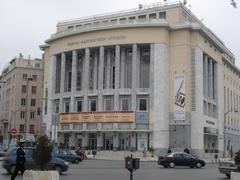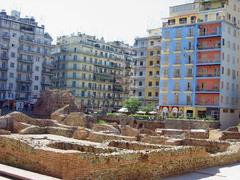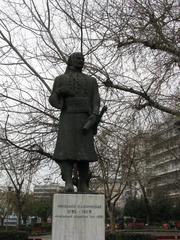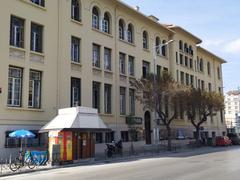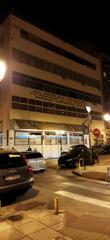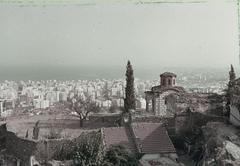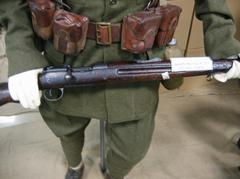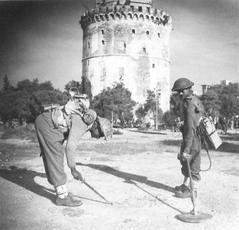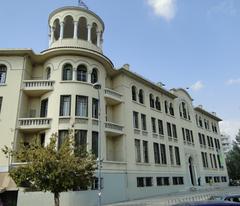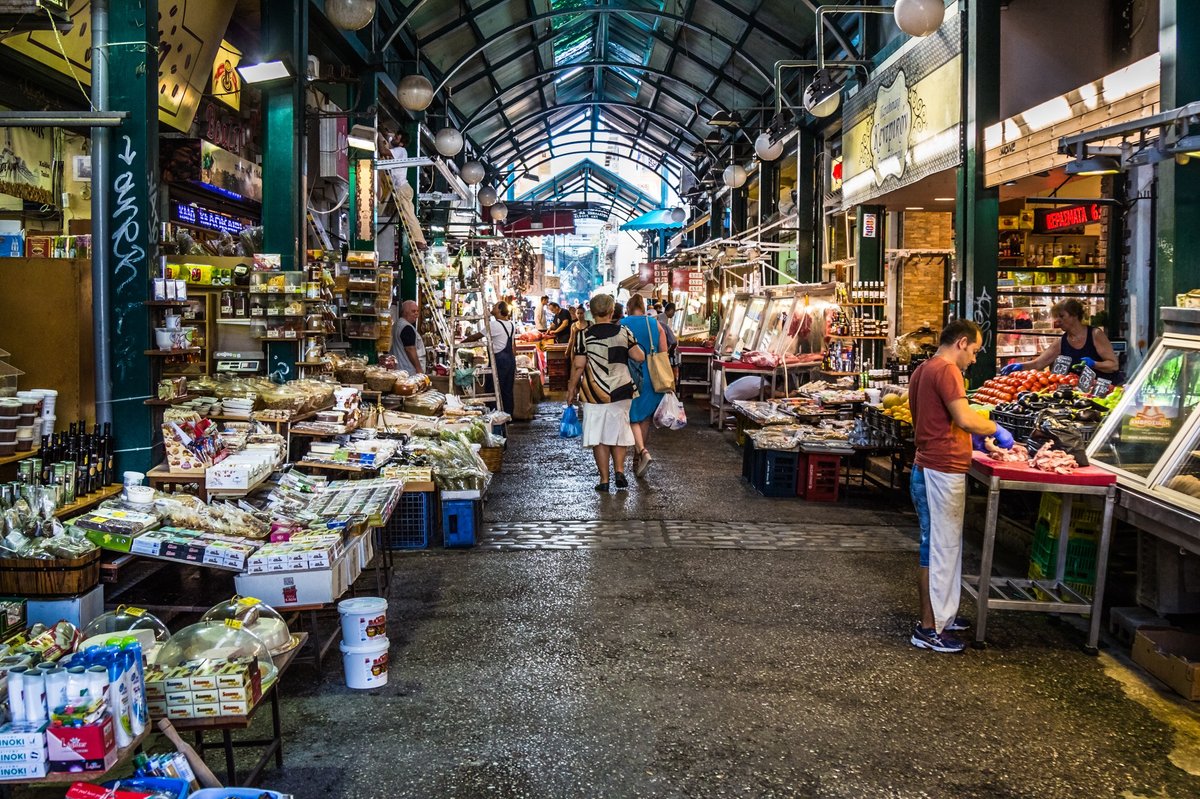
Comprehensive Guide to Visiting Kapani, Thessaloniki, Greece
Date: 16/08/2024
Introduction
Kapani Market, located in the heart of Thessaloniki, Greece, is a vibrant and historic marketplace that has been a cornerstone of the city’s commercial and cultural life since the 15th century. Known for its unique blend of tradition and modernity, Kapani Market offers visitors an immersive experience filled with history, culture, and a diverse array of goods. Established during the Ottoman period, the market’s name is derived from the Turkish word ‘Kapalı,’ meaning ‘covered,’ reflecting its origins as a covered bazaar (ingreece.wiki). The market’s architectural style, narrow alleys, and covered stalls are reminiscent of traditional Ottoman bazaars, providing a sheltered shopping experience that has been preserved through centuries (meetinthessaloniki.eu).
Thessaloniki’s rich Jewish heritage also plays a significant role in the market’s history. Following the expulsion of Jews from Spain in 1492, many Sephardic Jews settled in Thessaloniki, bringing with them unique cultural and culinary traditions that are still evident in the market today (meetinthessaloniki.eu). Over the centuries, Kapani Market has evolved and adapted to the changing socio-economic landscape, surviving numerous historical events, including the Great Fire of 1917. Today, it stands as a testament to Thessaloniki’s resilience and cultural richness, attracting locals and tourists alike who come to savor the authentic flavors and vibrant atmosphere of this historical landmark (ingreece.wiki).
Exploring Kapani Market offers a unique opportunity to delve into the city’s diverse cultural heritage. From fresh produce and traditional Greek products to household items and clothing, the market’s offerings reflect the various communities that have shaped Thessaloniki’s history. Whether you’re a history enthusiast, a foodie, or simply a curious traveler, Kapani Market promises a captivating and enriching experience.
Table of Contents
- Historical Background
- Market Layout
- Offerings
- Visitor Information
- Nearby Attractions and Accessibility
- Cultural Insights
- Frequently Asked Questions (FAQ)
- Special Events
- Practical Tips
- Safety Tips
- Call to Action
Historical Background
Origins and Establishment
Kapani Market, located in the heart of Thessaloniki, Greece, is a historical and cultural landmark that dates back to the 15th century. The market was established during the Ottoman period, a time when Thessaloniki was a significant urban center within the Ottoman Empire. The name ‘Kapani’ is derived from the Turkish word ‘Kapalı,’ meaning ‘covered,’ indicating that the market was initially a covered bazaar. This historical context is crucial as it highlights the market’s long-standing role as a commercial hub in the city (ingreece.wiki).
Ottoman Influence
The Ottoman influence on Kapani Market is evident in its architectural style and the variety of goods sold. During the Ottoman era, the market was a bustling center where traders from different parts of the empire converged to sell their wares. This period saw the introduction of various spices, textiles, and other goods that are still prevalent in the market today. The market’s layout, with its narrow alleys and covered stalls, reflects the typical design of Ottoman bazaars, aimed at providing a sheltered shopping experience (meetinthessaloniki.eu).
Jewish Heritage
Thessaloniki, often referred to as the ‘mother of Jerusalem,’ has a rich Jewish heritage that also permeates Kapani Market. The city was home to a significant Jewish population, especially after the expulsion of Jews from Spain in 1492. These Sephardic Jews brought with them their unique cultural and culinary traditions, which have left an indelible mark on the market. Jewish merchants were among the many traders who contributed to the market’s diverse offerings, adding to its multicultural tapestry (meetinthessaloniki.eu).
Evolution Through the Centuries
Over the centuries, Kapani Market has evolved, adapting to the changing socio-economic landscape of Thessaloniki. The market has survived numerous historical events, including the Great Fire of 1917, which devastated much of the city. Despite such challenges, Kapani Market has remained a resilient and integral part of Thessaloniki’s commercial life. The market’s ability to adapt and thrive through various historical periods is a testament to its enduring significance (ingreece.wiki).
Modern-Day Significance
Today, Kapani Market is not just a place for commerce but a cultural landmark that embodies the spirit of Thessaloniki. It serves as a living museum where the past and present coexist, offering visitors a glimpse into the city’s rich history and vibrant culture. The market continues to be a bustling hub where locals and tourists alike can experience the authentic flavors and traditions of Greece. The market’s enduring popularity is a reflection of its historical and cultural significance, making it a must-visit destination for anyone exploring Thessaloniki (ingreece.wiki).
Architectural Features
The architectural features of Kapani Market are a blend of Ottoman and Greek influences. The market’s narrow alleys and covered stalls are reminiscent of traditional Ottoman bazaars, designed to provide a sheltered shopping experience. Over time, these structures have been modified and renovated to accommodate modern needs while preserving their historical essence. The market’s architecture serves as a physical reminder of its long and varied history, offering a unique backdrop for the vibrant commercial activities that take place within its confines (ingreece.wiki).
Cultural Impact
Kapani Market’s cultural impact extends beyond its role as a commercial hub. It is a place where traditions are cherished and passed down through generations. The market is a microcosm of Thessaloniki’s diverse cultural heritage, reflecting the influences of various communities that have called the city home. From the Ottoman traders to the Jewish merchants and the local Greek vendors, each group has contributed to the market’s rich cultural tapestry. This diversity is evident in the variety of goods sold, the languages spoken, and the culinary traditions celebrated within the market (meetinthessaloniki.eu).
Preservation Efforts
Efforts to preserve Kapani Market’s historical and cultural heritage are ongoing. Local authorities and community organizations are actively involved in initiatives aimed at maintaining the market’s unique character while ensuring its sustainability. These efforts include restoration projects, cultural events, and promotional activities designed to attract visitors and raise awareness about the market’s significance. By preserving Kapani Market, Thessaloniki not only safeguards a vital part of its history but also promotes cultural tourism, contributing to the city’s economic and social well-being (ingreece.wiki).
Visitor Experience
For visitors, Kapani Market offers a unique opportunity to immerse themselves in the history and culture of Thessaloniki. The market’s vibrant atmosphere, coupled with its historical significance, makes it a captivating destination. Visitors can explore the labyrinthine alleys, interact with friendly vendors, and sample a wide array of local delicacies. The market’s rich history adds depth to the visitor experience, providing a context for the diverse offerings and lively interactions that define Kapani Market (ingreece.wiki).
Market Layout
Fish and Seafood
The streets of Askitou and Menexes are known for their fresh fish and seafood. Here, fishmongers display their gourmet catches on beds of ice, creating a vibrant and aromatic atmosphere (You in Greece).
Meat and Poultry
The butcher shops are primarily located on Vlali Street. These shops offer a wide range of meats, including specialized cuts like tripe and trotters (Incredible Greece).
Fruits and Vegetables
Fresh produce is abundant throughout the market, with vendors offering a colorful array of fruits and vegetables. The central area of the market is particularly known for its fresh produce (Greek Gastronomy Guide).
Spices and Olives
Shops selling spices and olives are scattered throughout the market. These shops offer a variety of olives from regions like Halkidiki, Volos, and Thassos, as well as an extensive selection of spices (Greek Gastronomy Guide).
Household Items and Clothing
The market also features shops selling household items, clothing, and shoes. These shops are primarily located on the streets of Spandoni and Solomou (Incredible Greece).
Offerings
Food and Beverages
The market is renowned for its fresh food offerings, including fish, meat, vegetables, fruits, and spices. Specialty shops sell olives, nuts, and sweets, providing a taste of local flavors (Thessaloniki Tourism).
Traditional Greek Products
Visitors can find traditional Greek products such as cheeses, cured meats, and local delicacies. These items offer a glimpse into the region’s rich gastronomic history (Love Thessaloniki).
Household Goods
The market also features shops selling household items like wicker baskets, makeshift furniture, and kitchen utensils. These items are often handmade, reflecting the local craftsmanship (Greek Gastronomy Guide).
Clothing and Accessories
Various shops offer clothing, shoes, and accessories at affordable prices. These items range from everyday wear to traditional Greek attire (Incredible Greece).
Ecclesiastical and Touristic Items
The market also includes shops selling ecclesiastical items and souvenirs, making it a popular destination for tourists looking to take home a piece of Thessaloniki (Love Thessaloniki).
Visitor Information
Kapani Market Visiting Hours
The market is open from Monday to Saturday, with varying hours. It is closed on Sundays. Visiting early in the morning can help you avoid the crowds and get the freshest produce (Thessaloniki Tourism).
Kapani Market Tickets
There is no entrance fee to visit Kapani Market. It is free for all visitors.
Visitor Tips
Best Time to Visit Kapani Market
Visiting early in the morning can help you avoid the crowds and get the freshest produce (Thessaloniki Tourism).
How to Bargain at Kapani Market
Bargaining is a common practice in Kapani Market. Don’t hesitate to negotiate prices, especially if you are buying in bulk (Greek Gastronomy Guide).
Local Delicacies
Don’t miss the opportunity to try traditional Greek coffee at one of the market’s cafes. Hozeva is a popular spot for a coffee break (Love Thessaloniki).
Exploration
Take your time to explore the market’s various sections. Each area offers a unique experience, from the bustling fish market to the aromatic spice shops (Incredible Greece).
Safety
While Kapani Market is generally safe, it’s always a good idea to keep an eye on your belongings, especially in crowded areas (Thessaloniki Tourism).
Nearby Attractions and Accessibility
Kapani Market is located in the heart of Thessaloniki, making it easily accessible. Nearby attractions include the Aristotelous Square, the Roman Agora, and the Rotunda. Public transportation options are available, including buses and taxis, making it convenient for visitors to reach the market.
Cultural Insights
Kapani Market is not just a place to shop; it’s a cultural experience that offers a glimpse into the daily life of Thessaloniki’s residents. The market’s vibrant atmosphere, combined with its rich history, makes it a must-visit destination for anyone interested in the city’s culture and traditions (Greek Gastronomy Guide).
The market’s layout and offerings reflect the diverse influences that have shaped Thessaloniki over the centuries. From Ottoman-era architecture to traditional Greek products, Kapani Market is a living testament to the city’s multicultural heritage (You in Greece).
Frequently Asked Questions (FAQ)
What are Kapani Market’s visiting hours?
Kapani Market is open from Monday to Saturday, with varying hours. It is closed on Sundays.
Is there an entrance fee for Kapani Market?
No, there is no entrance fee to visit Kapani Market. It is free for all visitors.
How can I reach Kapani Market?
Kapani Market is located in the heart of Thessaloniki, bounded by Egnatia, Aristotelous, Ermou, and Venizelou streets. It is accessible by public transportation, including buses and taxis.
What types of products can I find at Kapani Market?
Kapani Market offers a wide range of products, including fresh fish, meat, fruits, vegetables, spices, olives, household items, clothing, and souvenirs.
Conclusion
Kapani Market in Thessaloniki is more than just a marketplace; it is a living museum where history, culture, and commerce converge. Established in the 15th century during the Ottoman period, the market has played a pivotal role in the city’s commercial life for centuries. Its architectural features and layout are a testament to its Ottoman and Jewish influences, offering visitors a glimpse into the past while providing a vibrant shopping experience (ingreece.wiki). Today, Kapani Market continues to be a bustling hub where locals and tourists can explore a diverse range of goods, from fresh produce and traditional Greek products to household items and clothing. The market’s cultural impact extends beyond its role as a commercial center, reflecting the rich tapestry of traditions and communities that have shaped Thessaloniki over the years (meetinthessaloniki.eu).
Ongoing preservation efforts ensure that Kapani Market retains its unique character while adapting to modern needs. These initiatives not only safeguard a vital part of Thessaloniki’s history but also promote cultural tourism, contributing to the city’s economic and social well-being (ingreece.wiki). For visitors, Kapani Market offers a unique and immersive experience, allowing them to engage with the local culture, sample delicious delicacies, and explore the market’s labyrinthine alleys. Its enduring popularity is a reflection of its historical and cultural significance, making it a must-visit destination for anyone exploring Thessaloniki. Whether you’re drawn by its rich history, diverse offerings, or vibrant atmosphere, Kapani Market promises an unforgettable experience that captures the essence of Thessaloniki.
References
- ingreece.wiki (n.d.). Kapani Market. Retrieved from https://ingreece.wiki/thessaloniki/kapani-market/
- meetinthessaloniki.eu (n.d.). The Market of Thessaloniki. Retrieved from https://meetinthessaloniki.eu/en/articles/the-market-of-thessaloniki/
- Greek Gastronomy Guide (n.d.). Agora Kapani Thessaloniki. Retrieved from https://www.greekgastronomyguide.gr/en/item/agora-kapani-thessaloniki/
- Love Thessaloniki (2016, November 21). Kapani Market. Retrieved from https://lovethessaloniki.com/2016/11/21/kapani-market/
- Incredible Greece (n.d.). City’s Historic Flea Markets. Retrieved from https://www.incredible-greece.com/thessaloniki/citys-historic-flea-markets
- Thessaloniki Tourism (n.d.). Kapani Market. Retrieved from https://www.thessalonikitourism.gr/index.php/en/component/k2/item/164-kapani-market
- You in Greece (n.d.). Kapani Market. Retrieved from https://youingreece.com/thessaloniki/kapani-market
